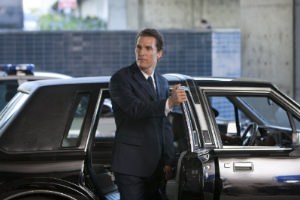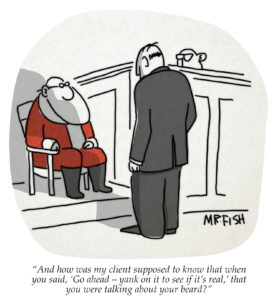A Smooth Ride in This ‘Lincoln’
Fine work by the actors, the writer and the filmmakers makes a noirish spin in LA feel like a drive back to the day when audiences considered such good movies a birthrightA noirish spin in L feels like a drive back to the day when audiences considered such good movies a birthright.
No, Mick Haller (Matthew McConaughey) is not known as “The Lincoln Lawyer” because he bears the slightest resemblance to The Great Emancipator. He is, in fact, a totally up-to-the-minute guy who wears rumpled but top-of-the-line suits, and bops from one courthouse to another in—yes—a Lincoln Town Car. The vehicle serves as his mobile office and bears the license plate “N-Guilty,” which is something of a misnomer since most of his clients are no more than one step ahead of the law—and often a couple of steps behind it.
Mick bears the stigmas of his type: He has an estranged wife (the always delicious Marisa Tomei), who is still up for a roll in the hay when the spirit moves them, a beloved child whom he does not get to spend enough time with, and a pressing need for a high-profile, high-paying case which might just get him off the treadmill to oblivion. That possibility presents itself in the form of Louis Roulet (Ryan Phillippe), charged with beating a prostitute half to death. He seems just a little too handsome and a little too earnest to be true. But a guy like Mick can’t afford to be too choosy.
Soon enough, he’s running all over Los Angeles, and in the manner typical of noirish novels (this one is based on one by Michael Connelly) he gets involved with biker gangs, snooty rich folks (Louis is just the tip of the iceberg in that realm), surly cops and William H. Macy’s hang-dog private eye, who is very nicely played as a sort of faithful, faintly depressed mutt who comes to a bad end. Thankfully, however, the picture does not. That’s in part because John Romano’s screenplay is very balanced—smart without being wise-guyish, busy with incident yet never frenzied. In part, it’s because Brad Furman establishes an excellent pace with the material—easy but not lazy. You never feel you’re being rushed through this story, or that corners are being cut. Every actor has at least one moment to strut his or her best stuff.
And McConaughey has lots of them. I’d like to have had a little more backstory about him. How come such a well-spoken chap has chosen to live among the lowly? Where did he learn to pitch his conversations with so many different classes of people on just the right note? Most important, how does he keep his conscience clean—at least in the more important matters—in his scuzzy context? He is, of course, a version of Raymond Chandler’s dinged-up private eye patrolling the latest iteration of L.A.’s mean streets, except he’s even cooler, more unruffled than Philip Marlowe ever thought to be.
Another way of putting all this is that “The Lincoln Lawyer” represents solid, professional moviemaking at its best. These people know that they’re not going to be contending for any awards at the end of the year. But that does not license them to patronize their material—or the audience, either. Yes, of course, this is genre filmmaking and yes, of course, we’re pretty certain, right from the get-go, that Phillippe’s character is going to turn out to be a nasty bit of goods. But who cares? There’s a confidence, a buoyancy, in the way this film carries us almost jauntily, never less than pleasingly, along its pleasurable path. There was a time when movies like this were like a birthright, something the average moviegoer thought he was routinely entitled to. Nowadays, they feel almost as rare as art. … And a lot more fun.
Your support matters…Independent journalism is under threat and overshadowed by heavily funded mainstream media.
You can help level the playing field. Become a member.
Your tax-deductible contribution keeps us digging beneath the headlines to give you thought-provoking, investigative reporting and analysis that unearths what's really happening- without compromise.
Give today to support our courageous, independent journalists.





You need to be a supporter to comment.
There are currently no responses to this article.
Be the first to respond.